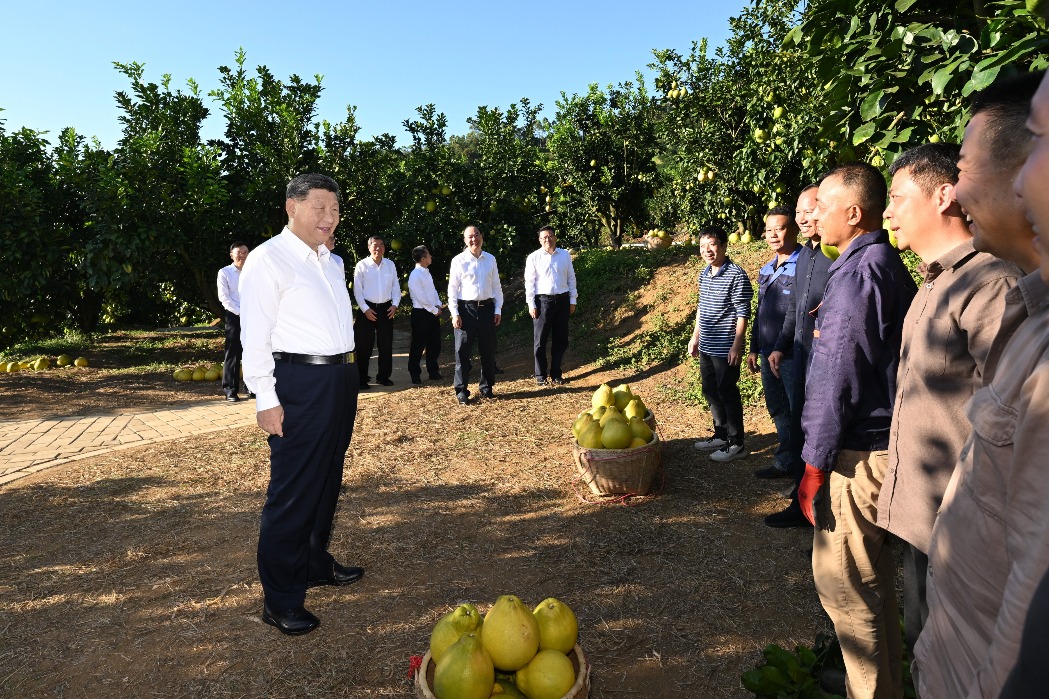Melodies of belonging and shared heritage echo across Strait


As the fall winds whisper through the bustling streets of Shanghai and the misty hills of Taipei, I find myself humming a tune that has long bridged the narrow waterway between the Chinese mainland and Taiwan: Tomorrow Will Be Better.
This anthem of hope and resilience, penned by Taiwan composer Lo Tayu and first performed at a charity concert in Hong Kong, soared across the Taiwan Strait, uniting mainland schoolchildren singing in morning assemblies with Taiwan families gathered around the piano on Chinese New Year. Melodies such as this, and the cultural tapestry they weave stand as timeless testaments to the profound, inseparable bonds between the mainland and Taiwan.
Let us begin with the simple power of a song. Consider The Olive Tree, Taiwan singer Chyi Yu's haunting ballad of longing and farewell. The song captured the ache of the diaspora and unfulfilled wanderlust, resonating on both sides of the Strait. I recall a rainy evening in Shanghai, years ago, when a street musician strummed the chords of his guitar, drawing a crowd of passers-by, some from Shanghai, some from other provinces, others with a familiar Taiwan accent. One listener, a Taiwan entrepreneur on a business trip, joined in, his voice cracking with emotion. At that very moment, the olive tree was not just a metaphor for elusive peace; it was us, reaching across the divide with shared yearning.
These songs are more like cultural couriers. Taiwan chanteuse Teresa Teng's I Only Care About You became a beloved anthem across the Strait. By the 1990s, as reform opened doors, her concerts in Hong Kong drew tears from audiences who had waited decades to hear her live. Likewise, Childhood by Lo Tayu evokes the bittersweet innocence of growing up, uniting mainland millennials reminiscing about courtyard games with their Taiwan compatriots sharing tales of school life. The Promise by Taiwan singer Chou Huei, with its vow of enduring commitment, feels almost prophetic, a pledge whispered between estranged kin.
Each of these songs carries the DNA of our common heritage: the poetic cadence of classical Chinese, the emotional depth of Confucian introspection and the innovative flair of 20th century fusion. They are not "Taiwan residents" or "mainland residents"; they are Chinese people, flowing like the Min River that once carried our ancestors from Fujian to Taiwan's shores.
This musical intimacy extends to the silver screen and television. Who among us has not been captivated by the wuxia (martial hero fiction) epics of Hong Kong novelist Louis Cha Leung-yung, adapted into dramas like The Legend of the Condor Heroes that aired on both the CCTV of the mainland and TTV of Taiwan? These tales of chivalry and loyalty, drawn from shared literary roots, transported viewers from the bustling hutongs of old Beijing to the lantern-lit streets of Kaohsiung. Films such as Ang Lee's Crouching Tiger, Hidden Dragon, a Taiwan director's global ode to wuxia aesthetics, premiered to mainland applause, proving our cinematic grammar is one and the same.
Entertainment exchanges deepen this synergy. Joint variety shows, like the mainland's Happy Camp inviting Taiwan idols or Kangxi Coming of Taiwan featuring mainland comedians, spark laughter that echoes familial banter. Concerts by Jay Chou in Shanghai or Faye Wong in Taipei draw mixed crowds chanting lyrics in unison.
These are lifelines, not mere spectacles. I'm reminded of a young couple I met at a cultural forum in Xiamen, Fujian province, she from Nanjing, Jiangsu province, he from Hsinchu, Taiwan, bonded over binge-watching Meteor Garden, the Taiwan drama that swept the mainland in the early 2000s. Their story, born of F4's boyish charm and shared adolescent crushes, culminated in a cross-Strait marriage. Culture, in these instances, is the thread stitching hearts together, defying any attempt to unravel it.
Yet as we revel in these joys, a sobering question arises: why must we defend what is so evidently ours? The push to sever cultural ties through bans on mainland media in Taiwan or restrictions on cross-Strait artists is a betrayal of our shared soul. It severs the arteries of our identity, pretending that the Minnan dialect spoken in Quanzhou, Fujian province, is alien to Tainan, Taiwan, or that Dragon Boat Festival's rhythms do not pulse identically in both realms. Such divisions sow suspicion where familiarity once bloomed, turning neighbors into strangers. This is a true tragedy: not the Strait itself, but the invisible walls we erect around our imagination.
Our cultures are tributaries of the same mighty Yangtze River of heritage, from the oracle bones of the Shang Dynasty (c.16th century-11th century BC) to the revolutionary fervor of the May Fourth Movement of 1919. To cut them apart is to dam a river, starving the delta of its lifeblood. Instead, let us amplify these exchanges: more co-productions, unfettered song streams, and festivals where artists from both sides jam under the same moon. Imagine a pan-Chinese music award or a film week in Fuzhou, Fujian, mirroring Cannes Film Festival, celebrating our indivisibility.
As Tomorrow Will Be Better fades into the night, its promise lingers: tomorrow will definitely be better, because of our unity. Let no force, political, ideological or otherwise, silence the songs that sing our oneness. For in their harmony, we hear the heartbeat of a greater China, eternal and unbroken.
The author is dean of the School of Foreign Languages at Sanda University in Shanghai.
The views don't necessarily represent those of China Daily.
If you have a specific expertise, or would like to share your thought about our stories, then send us your writings at opinion@chinadaily.com.cn, and comment@chinadaily.com.cn.

































